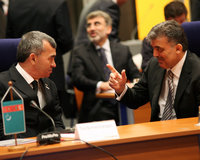On Sep. 6, the European Investment Bank, the European Bank for Reconstruction and Development, and the International Financial Corporation (a branch of the World Bank Group) signed a mandate letter with the consortium behind the Nabucco natural gas pipeline, marking the start of an appraisal process that will eventually secure a €4 billion financing package for the project. The three international financial institutions committed €2 billion, €1.2 billion and €800 million, respectively. Along with the more modest €200 million grant provided by the European Commission last March, the contributions will certainly boost confidence in the project among private investors, who must finance 70 percent of the estimated €7.9 billion necessary to complete the pipeline.
A few days after the signing, the consortium's managing director, Reinhard Mitschek, confirmed that the pipeline will be supplied by two feeder lines linking the Turkish terminal of Eruzum to Georgia and Iraq, adding that deliveries should start in late 2015. However, despite the progress in financing the project and the optimistic pronouncements, filling Nabucco with gas still represents a major challenge. A third feeder line from Iran, contemplated when the project was first proposed in 2002, has been ruled out for geopolitical reasons. And notwithstanding Mitschek's assurances, no binding agreement has yet been signed for the remaining two.
The Iraqi route is the most problematic, given the many unknowns surrounding the country's future. The Nabucco consortium and its members are currently working on two separate tracks in the country, receiving repeated reassurances from Iraqi Prime Minister Nouri al-Maliki while also working closely with the Kurdistan Regional Government (KRG) in northern Iraq. Maliki went so far as to promise to supply 15 billion cubic meters of gas at the signing of the intergovernmental agreement in Ankara in July 2009. And on Aug. 27, Germany's RWE, a partner in the consortium, signed a cooperation agreement with the KRG that includes the sale of up to 20 bcm to Turkey.

